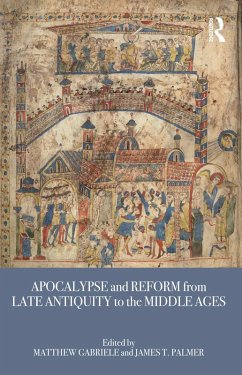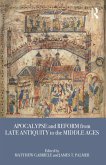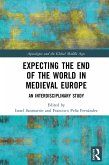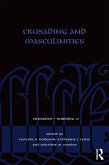Apocalypse and Reform from Late Antiquity to the Middle Ages (eBook, PDF)
Redaktion: Gabriele, Matthew; Palmer, James T.
41,95 €
41,95 €
inkl. MwSt.
Sofort per Download lieferbar

21 °P sammeln
41,95 €
Als Download kaufen

41,95 €
inkl. MwSt.
Sofort per Download lieferbar

21 °P sammeln
Jetzt verschenken
Alle Infos zum eBook verschenken
41,95 €
inkl. MwSt.
Sofort per Download lieferbar
Alle Infos zum eBook verschenken

21 °P sammeln
Apocalypse and Reform from Late Antiquity to the Middle Ages (eBook, PDF)
Redaktion: Gabriele, Matthew; Palmer, James T.
- Format: PDF
- Merkliste
- Auf die Merkliste
- Bewerten Bewerten
- Teilen
- Produkt teilen
- Produkterinnerung
- Produkterinnerung

Bitte loggen Sie sich zunächst in Ihr Kundenkonto ein oder registrieren Sie sich bei
bücher.de, um das eBook-Abo tolino select nutzen zu können.
Hier können Sie sich einloggen
Hier können Sie sich einloggen
Sie sind bereits eingeloggt. Klicken Sie auf 2. tolino select Abo, um fortzufahren.

Bitte loggen Sie sich zunächst in Ihr Kundenkonto ein oder registrieren Sie sich bei bücher.de, um das eBook-Abo tolino select nutzen zu können.
Apocalypse and Reform from Late Antiquity to the Middle Ages provides the ideal introduction to what reformist apocalypticism meant for the formation of Medieval Europe, from the Fall of Rome to the twelfth century.
- Geräte: PC
- mit Kopierschutz
- eBook Hilfe
- Größe: 1.25MB
Andere Kunden interessierten sich auch für
![Apocalypse and Reform from Late Antiquity to the Middle Ages (eBook, ePUB) Apocalypse and Reform from Late Antiquity to the Middle Ages (eBook, ePUB)]() Apocalypse and Reform from Late Antiquity to the Middle Ages (eBook, ePUB)41,95 €
Apocalypse and Reform from Late Antiquity to the Middle Ages (eBook, ePUB)41,95 €![Making England, 796-1042 (eBook, PDF) Making England, 796-1042 (eBook, PDF)]() Richard HuscroftMaking England, 796-1042 (eBook, PDF)41,95 €
Richard HuscroftMaking England, 796-1042 (eBook, PDF)41,95 €![Expecting the End of the World in Medieval Europe (eBook, PDF) Expecting the End of the World in Medieval Europe (eBook, PDF)]() Expecting the End of the World in Medieval Europe (eBook, PDF)42,95 €
Expecting the End of the World in Medieval Europe (eBook, PDF)42,95 €![Donations to the Knights Hospitaller in Britain and Ireland, 1291-1400 (eBook, PDF) Donations to the Knights Hospitaller in Britain and Ireland, 1291-1400 (eBook, PDF)]() Rory MaclellanDonations to the Knights Hospitaller in Britain and Ireland, 1291-1400 (eBook, PDF)42,95 €
Rory MaclellanDonations to the Knights Hospitaller in Britain and Ireland, 1291-1400 (eBook, PDF)42,95 €![Portraits of Medieval Europe, 800-1400 (eBook, PDF) Portraits of Medieval Europe, 800-1400 (eBook, PDF)]() Portraits of Medieval Europe, 800-1400 (eBook, PDF)41,95 €
Portraits of Medieval Europe, 800-1400 (eBook, PDF)41,95 €![Crusading and Masculinities (eBook, PDF) Crusading and Masculinities (eBook, PDF)]() Crusading and Masculinities (eBook, PDF)42,95 €
Crusading and Masculinities (eBook, PDF)42,95 €![The Changing English Countryside, 1400-1700 (eBook, PDF) The Changing English Countryside, 1400-1700 (eBook, PDF)]() Leonard CantorThe Changing English Countryside, 1400-1700 (eBook, PDF)34,95 €
Leonard CantorThe Changing English Countryside, 1400-1700 (eBook, PDF)34,95 €-
-
-
Apocalypse and Reform from Late Antiquity to the Middle Ages provides the ideal introduction to what reformist apocalypticism meant for the formation of Medieval Europe, from the Fall of Rome to the twelfth century.
Dieser Download kann aus rechtlichen Gründen nur mit Rechnungsadresse in A, B, BG, CY, CZ, D, DK, EW, E, FIN, F, GR, HR, H, IRL, I, LT, L, LR, M, NL, PL, P, R, S, SLO, SK ausgeliefert werden.
Produktdetails
- Produktdetails
- Verlag: Taylor & Francis eBooks
- Seitenzahl: 244
- Erscheinungstermin: 3. September 2018
- Englisch
- ISBN-13: 9780429950421
- Artikelnr.: 54664112
- Verlag: Taylor & Francis eBooks
- Seitenzahl: 244
- Erscheinungstermin: 3. September 2018
- Englisch
- ISBN-13: 9780429950421
- Artikelnr.: 54664112
- Herstellerkennzeichnung Die Herstellerinformationen sind derzeit nicht verfügbar.
Matthew Gabriele is Associate Professor and Coordinator of Medieval & Early Modern Studies in the Department of Religion and Culture at Virginia Tech, USA. His previous publications include An Empire of Memory: The Legend of Charlemagne, the Franks, and Jerusalem before the First Crusade (2011), The Legend of Charlemagne in the Middle Ages: Power, Faith, and Crusade (2008) and Where Heaven and Earth Meet: Essays on Medieval Europe in Honor of Daniel F. Callahan (2014). James T. Palmer is Reader in Medieval History at St Andrews, UK. His previous publications include The Apocalypse in the Early Middle Ages (2014) and Anglo-Saxons in a Frankish World 690-900 (2009).
Introduction; Chapter 1: "The Chronicle of Hydatius: a historical guidebook
to the last days of the Western Roman Empire"; Chapter 2: "To be found
prepared: eschatology and reform rhetoric ca. 570-ca. 640"; Chapter 3: "The
final countdown and the reform of the liturgical calendar in the early
Middle Ages"; Chapter 4: "Apocalypse and reform in Bede's De die iudicii";
Chapter 5: "Creating futures through the lens of revelation in the rhetoric
of the Carolingian Reform ca. 750 to ca. 900"; Chapter 6: "Eschatology and
reform in early Irish law: the evidence of Sunday legislation"; Chapter 7:
"Apocalypse, eschatology and the interim in England and Byzantium in the
tenth and eleventh centuries"; Chapter 8: "Apocalypticism and the rhetoric
of reform in Italy around the year 1000"; Chapter 9: "This time. Maybe this
time. Biblical commentary, monastic historiography, and Lost Cause-ism at
the turn of the first millennium"; Chapter 10: "Against the silence:
twelfth-century Augustinian reformers confront apocalypse"; Chapter 11:
Afterword
to the last days of the Western Roman Empire"; Chapter 2: "To be found
prepared: eschatology and reform rhetoric ca. 570-ca. 640"; Chapter 3: "The
final countdown and the reform of the liturgical calendar in the early
Middle Ages"; Chapter 4: "Apocalypse and reform in Bede's De die iudicii";
Chapter 5: "Creating futures through the lens of revelation in the rhetoric
of the Carolingian Reform ca. 750 to ca. 900"; Chapter 6: "Eschatology and
reform in early Irish law: the evidence of Sunday legislation"; Chapter 7:
"Apocalypse, eschatology and the interim in England and Byzantium in the
tenth and eleventh centuries"; Chapter 8: "Apocalypticism and the rhetoric
of reform in Italy around the year 1000"; Chapter 9: "This time. Maybe this
time. Biblical commentary, monastic historiography, and Lost Cause-ism at
the turn of the first millennium"; Chapter 10: "Against the silence:
twelfth-century Augustinian reformers confront apocalypse"; Chapter 11:
Afterword
Introduction; Chapter 1: "The Chronicle of Hydatius: a historical guidebook
to the last days of the Western Roman Empire"; Chapter 2: "To be found
prepared: eschatology and reform rhetoric ca. 570-ca. 640"; Chapter 3: "The
final countdown and the reform of the liturgical calendar in the early
Middle Ages"; Chapter 4: "Apocalypse and reform in Bede's De die iudicii";
Chapter 5: "Creating futures through the lens of revelation in the rhetoric
of the Carolingian Reform ca. 750 to ca. 900"; Chapter 6: "Eschatology and
reform in early Irish law: the evidence of Sunday legislation"; Chapter 7:
"Apocalypse, eschatology and the interim in England and Byzantium in the
tenth and eleventh centuries"; Chapter 8: "Apocalypticism and the rhetoric
of reform in Italy around the year 1000"; Chapter 9: "This time. Maybe this
time. Biblical commentary, monastic historiography, and Lost Cause-ism at
the turn of the first millennium"; Chapter 10: "Against the silence:
twelfth-century Augustinian reformers confront apocalypse"; Chapter 11:
Afterword
to the last days of the Western Roman Empire"; Chapter 2: "To be found
prepared: eschatology and reform rhetoric ca. 570-ca. 640"; Chapter 3: "The
final countdown and the reform of the liturgical calendar in the early
Middle Ages"; Chapter 4: "Apocalypse and reform in Bede's De die iudicii";
Chapter 5: "Creating futures through the lens of revelation in the rhetoric
of the Carolingian Reform ca. 750 to ca. 900"; Chapter 6: "Eschatology and
reform in early Irish law: the evidence of Sunday legislation"; Chapter 7:
"Apocalypse, eschatology and the interim in England and Byzantium in the
tenth and eleventh centuries"; Chapter 8: "Apocalypticism and the rhetoric
of reform in Italy around the year 1000"; Chapter 9: "This time. Maybe this
time. Biblical commentary, monastic historiography, and Lost Cause-ism at
the turn of the first millennium"; Chapter 10: "Against the silence:
twelfth-century Augustinian reformers confront apocalypse"; Chapter 11:
Afterword







